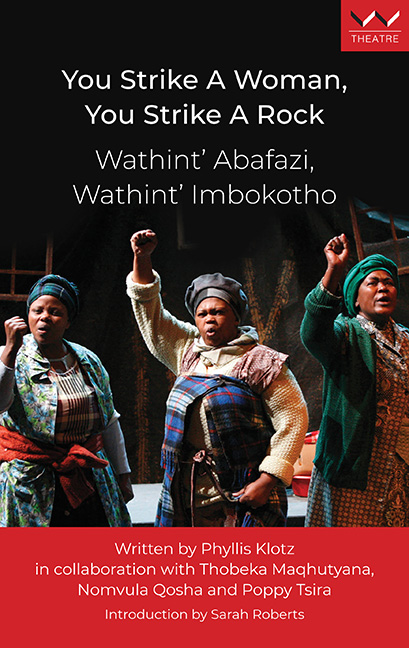Introduction: Women Protest in Life and on Stage
Published online by Cambridge University Press: 16 July 2022
Summary
When we watch, read, or play out scenes from You Strike a Woman, You Strike a Rock we become aware of how events from the distant past intersect with experiences of everyday living in more recent times. We also see a blend of historical incident with creative fabrication in a powerful theatrical expression of women's experiences within racist and patriarchal power systems. More than two decades after its first performances, the play – with its dedication to iconic historical female figures – has become part of a socio-cultural record as a rich testament to a specific period that commemorates the lives of hundreds of township women.
In Langa township outside Cape Town, a protest against the enforced use of the ‘dompas’ (passbook), a symbol of apartheid oppression and subjugation, took place on 4 January 1953. Dora Tamana, an anti-apartheid activist and trade unionist, spoke these words of defiance:
We women will never carry these passes … We have seen unemployment, lack of accommodation and families broken because of passes. We have seen it with our men. Who will look after our children when we go to jail for a small technical offence [of] not having a pass?
Three years later, on Thursday 9 August 1956, an estimated 20 000 women from all walks of life converged on the Union Buildings in Pretoria – the symbolic seat of the apartheid government – to hand over to Prime Minister J G Strijdom 14 000 signed petitions. These petitions spelt out the violations, indignities and constraints embedded in the pass laws and the impact the proposed amendment to existing legislation would have on the lives of black women and girls.
The Women's March was a powerful, affective and theatrical public intervention. As in theatre, some individuals featured prominently, while others remained anonymous. The march was led by Lilian Ngoyi, Helen Joseph, Albertina Sisulu and Sophia Williams de Bruyn, who are memorialised in statues erected in the Lilian Ngoyi Square, Pretoria. In 1956 the mass of 20 000 women stood in silence for half an hour, then sang ‘Nkosi sikelel’ iAfrika’, followed by the women’s struggle anthem, ‘Wathint’ abafazi, wathint’ imbokotho, uza kufa!’
Public intellectual, academic and writer Njabulo Ndebele, in an essay entitled ‘Actors and Interpreters’, probes the differences between efforts of ordinary people as agents of socio-economic and political transformation and those of radical theatre makers and artists.
- Type
- Chapter
- Information
- You Strike a Woman, You Strike a Rock / Wathint' Abafazi, Wathint' ImbokothoA play, pp. vii - xviiiPublisher: Wits University PressPrint publication year: 2021



